Taxation Law: Assessing Anna McCartney's Taxable Income and Deductions
VerifiedAdded on 2023/01/10
|11
|2481
|80
Report
AI Summary
This report provides a detailed analysis of Anna McCartney's tax situation, covering various aspects of Australian taxation law. It examines the assessability of her income, including a sign-on bonus, salary, and bonuses received during the financial year 2017-2018. The report delves into the tax treatment of her employer's superannuation contributions and Anna's own salary sacrifice contributions. It further explores the deductibility of work-related expenses, such as travel and conference fees, as well as car allowances. The report also addresses the tax implications of frequent flyer points and a compensation payment received due to workplace injuries. The analysis is supported by relevant case law, legislative references, and rulings, providing a comprehensive understanding of Anna's taxable income and allowable deductions. The report concludes with a summary of Anna's assessable income, allowable deductions, and total taxable income for the financial year.
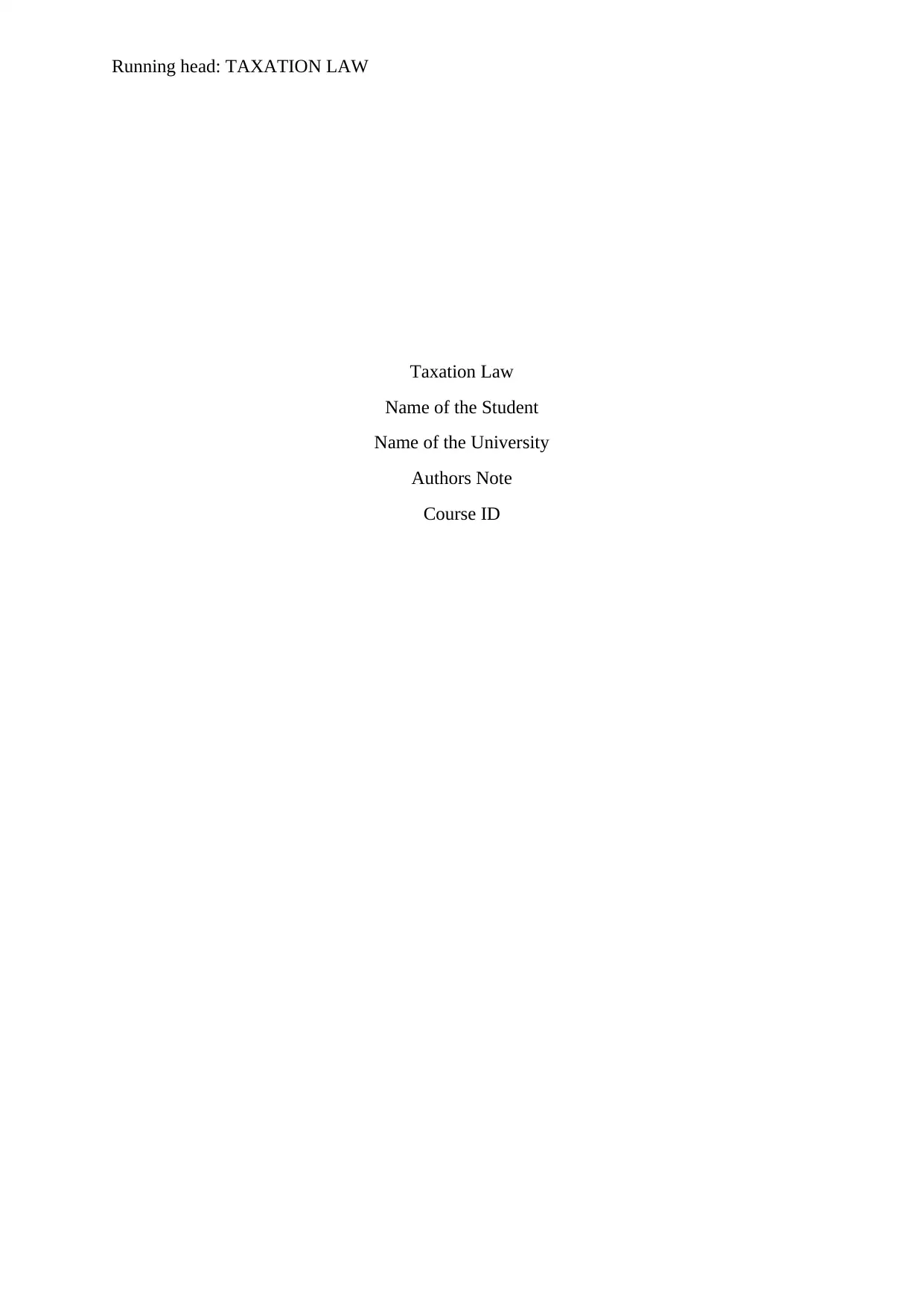
Running head: TAXATION LAW
Taxation Law
Name of the Student
Name of the University
Authors Note
Course ID
Taxation Law
Name of the Student
Name of the University
Authors Note
Course ID
Paraphrase This Document
Need a fresh take? Get an instant paraphrase of this document with our AI Paraphraser
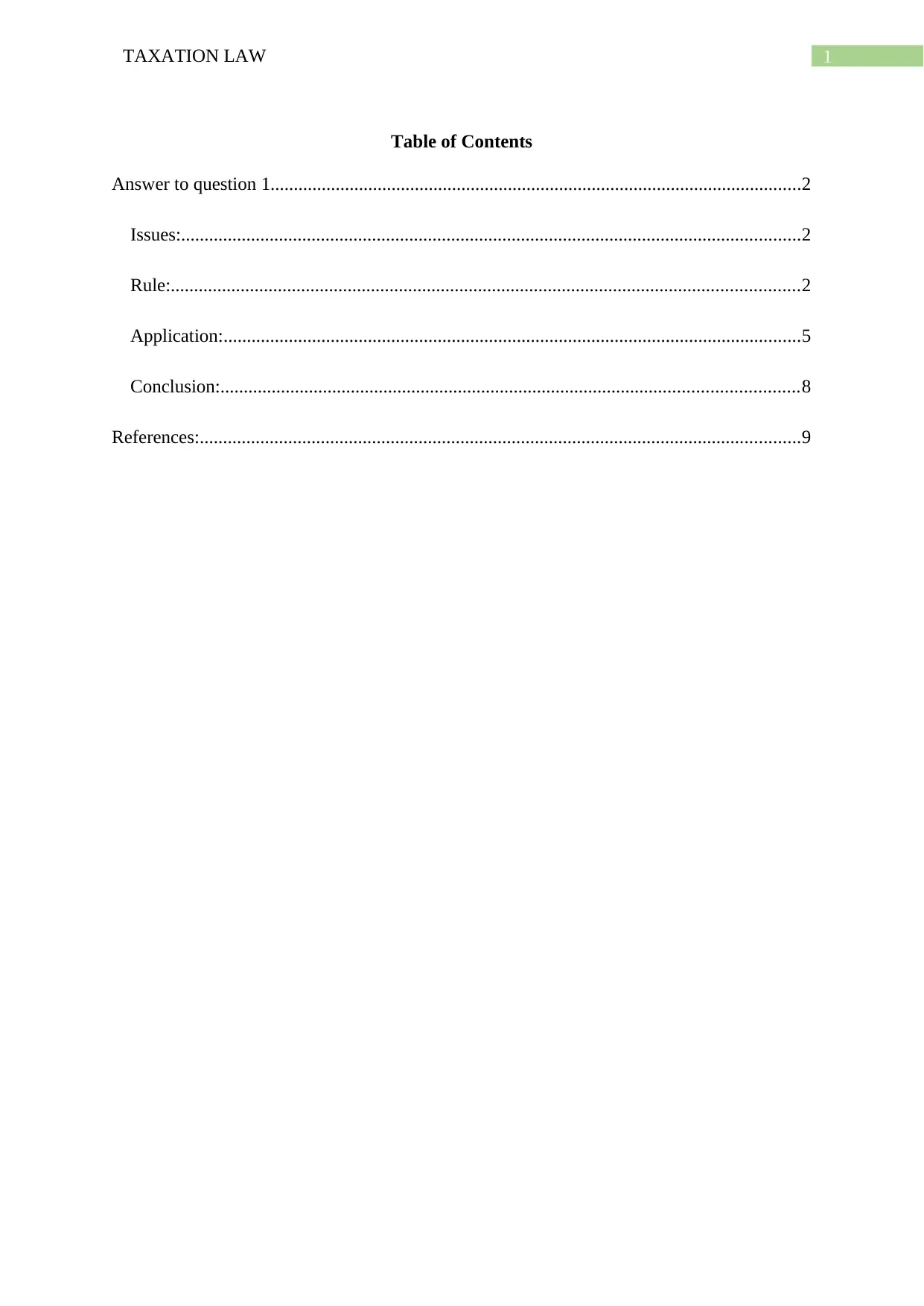
1TAXATION LAW
Table of Contents
Answer to question 1..................................................................................................................2
Issues:.....................................................................................................................................2
Rule:.......................................................................................................................................2
Application:............................................................................................................................5
Conclusion:............................................................................................................................8
References:.................................................................................................................................9
Table of Contents
Answer to question 1..................................................................................................................2
Issues:.....................................................................................................................................2
Rule:.......................................................................................................................................2
Application:............................................................................................................................5
Conclusion:............................................................................................................................8
References:.................................................................................................................................9
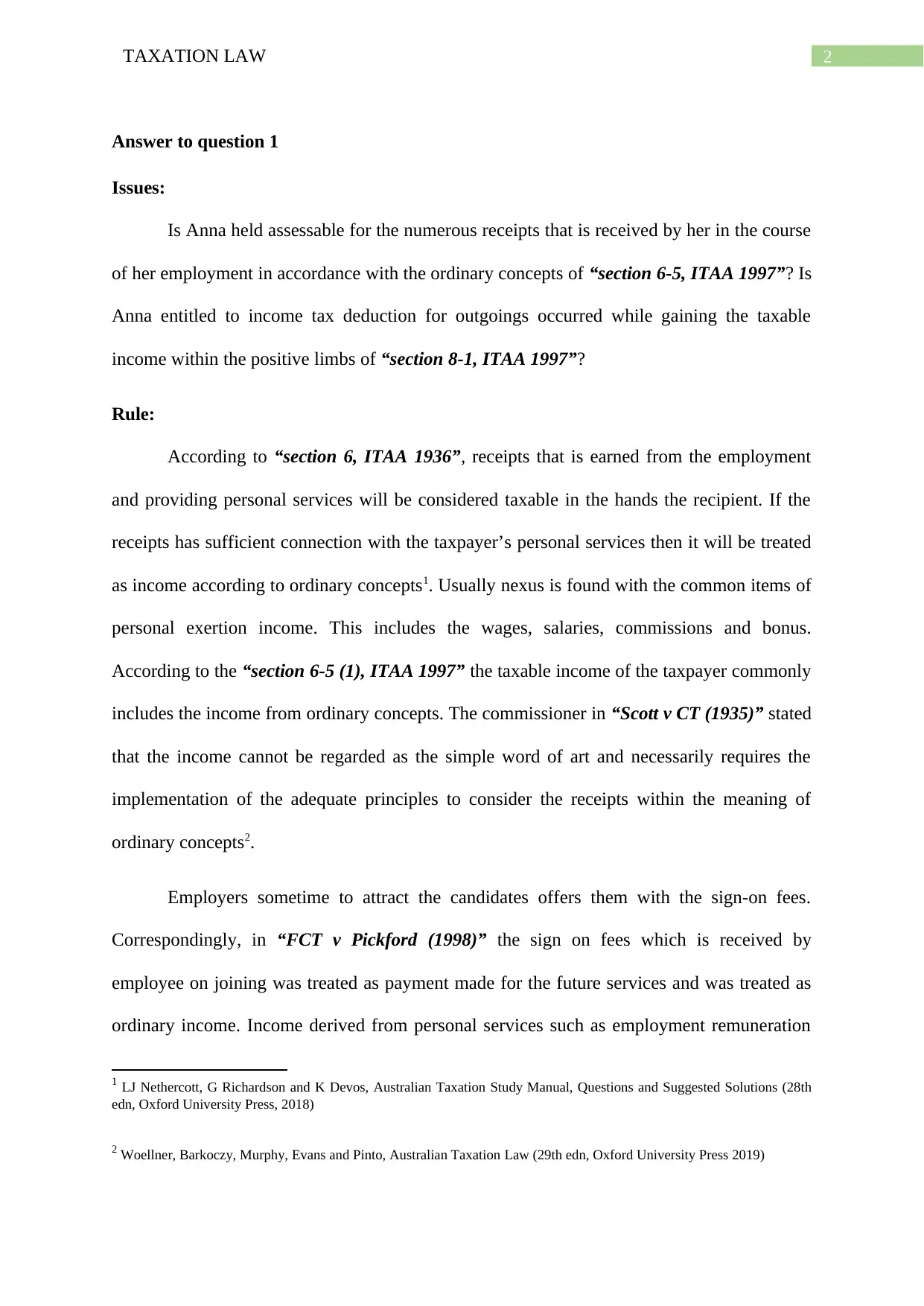
2TAXATION LAW
Answer to question 1
Issues:
Is Anna held assessable for the numerous receipts that is received by her in the course
of her employment in accordance with the ordinary concepts of “section 6-5, ITAA 1997”? Is
Anna entitled to income tax deduction for outgoings occurred while gaining the taxable
income within the positive limbs of “section 8-1, ITAA 1997”?
Rule:
According to “section 6, ITAA 1936”, receipts that is earned from the employment
and providing personal services will be considered taxable in the hands the recipient. If the
receipts has sufficient connection with the taxpayer’s personal services then it will be treated
as income according to ordinary concepts1. Usually nexus is found with the common items of
personal exertion income. This includes the wages, salaries, commissions and bonus.
According to the “section 6-5 (1), ITAA 1997” the taxable income of the taxpayer commonly
includes the income from ordinary concepts. The commissioner in “Scott v CT (1935)” stated
that the income cannot be regarded as the simple word of art and necessarily requires the
implementation of the adequate principles to consider the receipts within the meaning of
ordinary concepts2.
Employers sometime to attract the candidates offers them with the sign-on fees.
Correspondingly, in “FCT v Pickford (1998)” the sign on fees which is received by
employee on joining was treated as payment made for the future services and was treated as
ordinary income. Income derived from personal services such as employment remuneration
1 LJ Nethercott, G Richardson and K Devos, Australian Taxation Study Manual, Questions and Suggested Solutions (28th
edn, Oxford University Press, 2018)
2 Woellner, Barkoczy, Murphy, Evans and Pinto, Australian Taxation Law (29th edn, Oxford University Press 2019)
Answer to question 1
Issues:
Is Anna held assessable for the numerous receipts that is received by her in the course
of her employment in accordance with the ordinary concepts of “section 6-5, ITAA 1997”? Is
Anna entitled to income tax deduction for outgoings occurred while gaining the taxable
income within the positive limbs of “section 8-1, ITAA 1997”?
Rule:
According to “section 6, ITAA 1936”, receipts that is earned from the employment
and providing personal services will be considered taxable in the hands the recipient. If the
receipts has sufficient connection with the taxpayer’s personal services then it will be treated
as income according to ordinary concepts1. Usually nexus is found with the common items of
personal exertion income. This includes the wages, salaries, commissions and bonus.
According to the “section 6-5 (1), ITAA 1997” the taxable income of the taxpayer commonly
includes the income from ordinary concepts. The commissioner in “Scott v CT (1935)” stated
that the income cannot be regarded as the simple word of art and necessarily requires the
implementation of the adequate principles to consider the receipts within the meaning of
ordinary concepts2.
Employers sometime to attract the candidates offers them with the sign-on fees.
Correspondingly, in “FCT v Pickford (1998)” the sign on fees which is received by
employee on joining was treated as payment made for the future services and was treated as
ordinary income. Income derived from personal services such as employment remuneration
1 LJ Nethercott, G Richardson and K Devos, Australian Taxation Study Manual, Questions and Suggested Solutions (28th
edn, Oxford University Press, 2018)
2 Woellner, Barkoczy, Murphy, Evans and Pinto, Australian Taxation Law (29th edn, Oxford University Press 2019)
⊘ This is a preview!⊘
Do you want full access?
Subscribe today to unlock all pages.

Trusted by 1+ million students worldwide
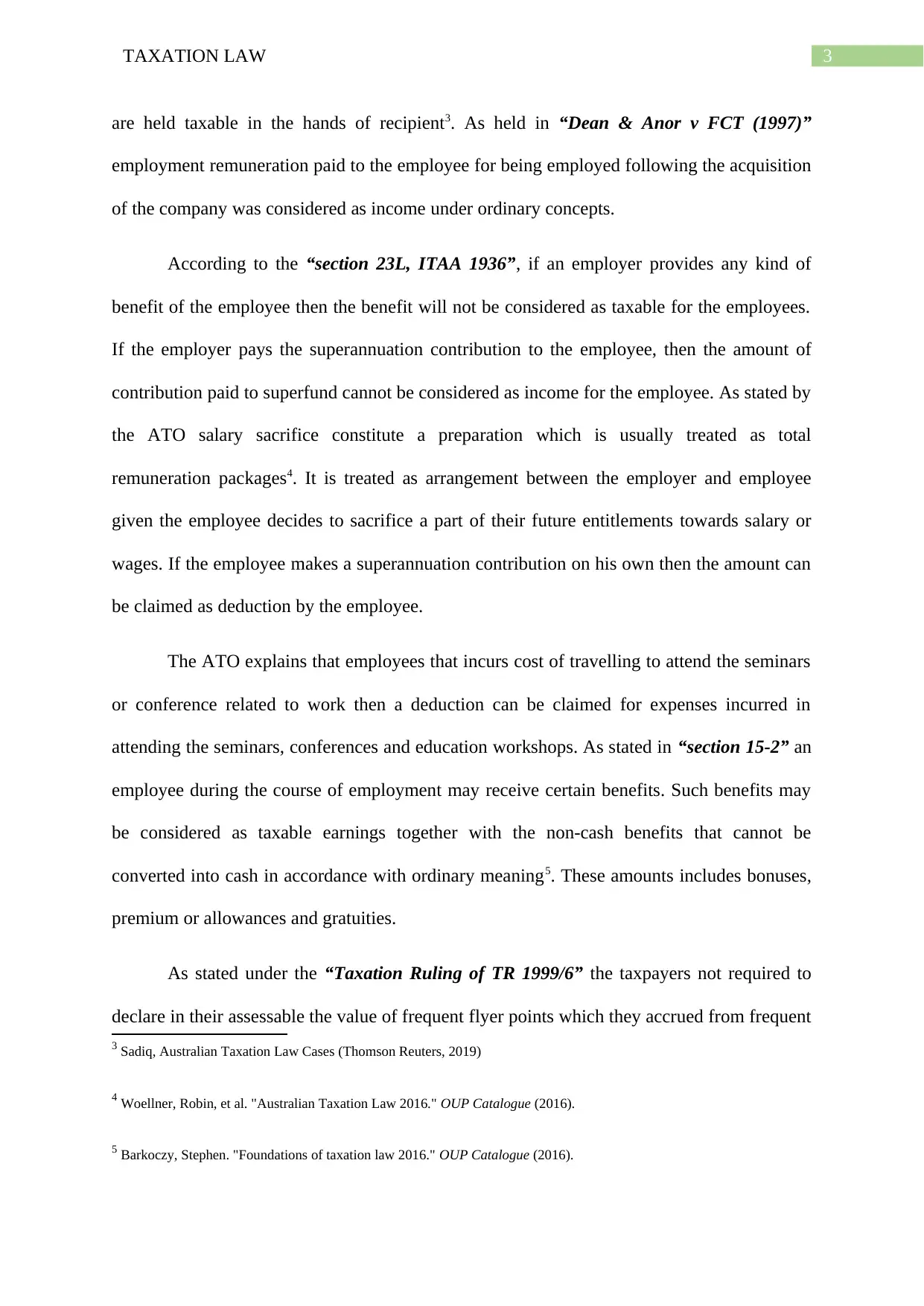
3TAXATION LAW
are held taxable in the hands of recipient3. As held in “Dean & Anor v FCT (1997)”
employment remuneration paid to the employee for being employed following the acquisition
of the company was considered as income under ordinary concepts.
According to the “section 23L, ITAA 1936”, if an employer provides any kind of
benefit of the employee then the benefit will not be considered as taxable for the employees.
If the employer pays the superannuation contribution to the employee, then the amount of
contribution paid to superfund cannot be considered as income for the employee. As stated by
the ATO salary sacrifice constitute a preparation which is usually treated as total
remuneration packages4. It is treated as arrangement between the employer and employee
given the employee decides to sacrifice a part of their future entitlements towards salary or
wages. If the employee makes a superannuation contribution on his own then the amount can
be claimed as deduction by the employee.
The ATO explains that employees that incurs cost of travelling to attend the seminars
or conference related to work then a deduction can be claimed for expenses incurred in
attending the seminars, conferences and education workshops. As stated in “section 15-2” an
employee during the course of employment may receive certain benefits. Such benefits may
be considered as taxable earnings together with the non-cash benefits that cannot be
converted into cash in accordance with ordinary meaning5. These amounts includes bonuses,
premium or allowances and gratuities.
As stated under the “Taxation Ruling of TR 1999/6” the taxpayers not required to
declare in their assessable the value of frequent flyer points which they accrued from frequent
3 Sadiq, Australian Taxation Law Cases (Thomson Reuters, 2019)
4 Woellner, Robin, et al. "Australian Taxation Law 2016." OUP Catalogue (2016).
5 Barkoczy, Stephen. "Foundations of taxation law 2016." OUP Catalogue (2016).
are held taxable in the hands of recipient3. As held in “Dean & Anor v FCT (1997)”
employment remuneration paid to the employee for being employed following the acquisition
of the company was considered as income under ordinary concepts.
According to the “section 23L, ITAA 1936”, if an employer provides any kind of
benefit of the employee then the benefit will not be considered as taxable for the employees.
If the employer pays the superannuation contribution to the employee, then the amount of
contribution paid to superfund cannot be considered as income for the employee. As stated by
the ATO salary sacrifice constitute a preparation which is usually treated as total
remuneration packages4. It is treated as arrangement between the employer and employee
given the employee decides to sacrifice a part of their future entitlements towards salary or
wages. If the employee makes a superannuation contribution on his own then the amount can
be claimed as deduction by the employee.
The ATO explains that employees that incurs cost of travelling to attend the seminars
or conference related to work then a deduction can be claimed for expenses incurred in
attending the seminars, conferences and education workshops. As stated in “section 15-2” an
employee during the course of employment may receive certain benefits. Such benefits may
be considered as taxable earnings together with the non-cash benefits that cannot be
converted into cash in accordance with ordinary meaning5. These amounts includes bonuses,
premium or allowances and gratuities.
As stated under the “Taxation Ruling of TR 1999/6” the taxpayers not required to
declare in their assessable the value of frequent flyer points which they accrued from frequent
3 Sadiq, Australian Taxation Law Cases (Thomson Reuters, 2019)
4 Woellner, Robin, et al. "Australian Taxation Law 2016." OUP Catalogue (2016).
5 Barkoczy, Stephen. "Foundations of taxation law 2016." OUP Catalogue (2016).
Paraphrase This Document
Need a fresh take? Get an instant paraphrase of this document with our AI Paraphraser
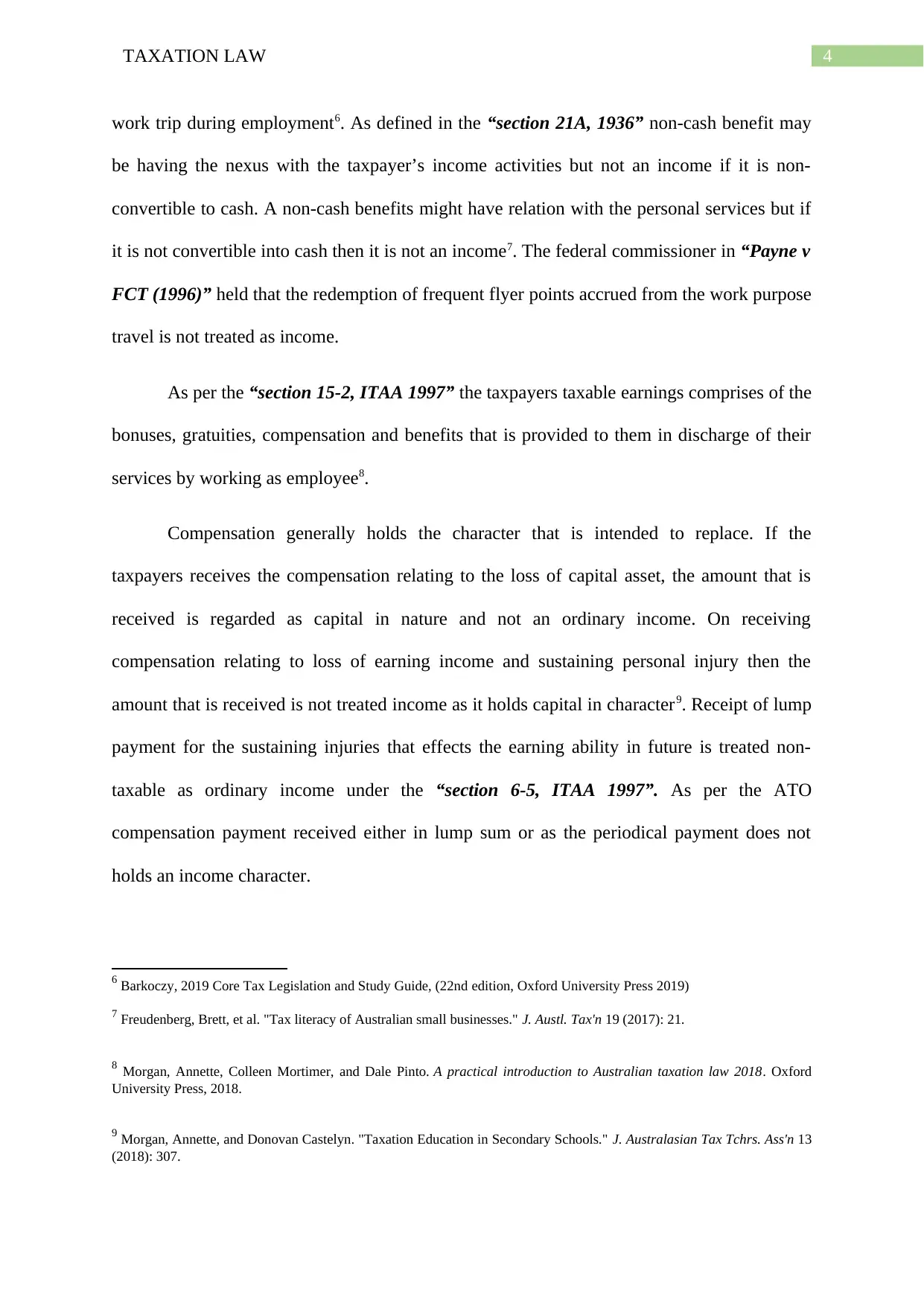
4TAXATION LAW
work trip during employment6. As defined in the “section 21A, 1936” non-cash benefit may
be having the nexus with the taxpayer’s income activities but not an income if it is non-
convertible to cash. A non-cash benefits might have relation with the personal services but if
it is not convertible into cash then it is not an income7. The federal commissioner in “Payne v
FCT (1996)” held that the redemption of frequent flyer points accrued from the work purpose
travel is not treated as income.
As per the “section 15-2, ITAA 1997” the taxpayers taxable earnings comprises of the
bonuses, gratuities, compensation and benefits that is provided to them in discharge of their
services by working as employee8.
Compensation generally holds the character that is intended to replace. If the
taxpayers receives the compensation relating to the loss of capital asset, the amount that is
received is regarded as capital in nature and not an ordinary income. On receiving
compensation relating to loss of earning income and sustaining personal injury then the
amount that is received is not treated income as it holds capital in character9. Receipt of lump
payment for the sustaining injuries that effects the earning ability in future is treated non-
taxable as ordinary income under the “section 6-5, ITAA 1997”. As per the ATO
compensation payment received either in lump sum or as the periodical payment does not
holds an income character.
6 Barkoczy, 2019 Core Tax Legislation and Study Guide, (22nd edition, Oxford University Press 2019)
7 Freudenberg, Brett, et al. "Tax literacy of Australian small businesses." J. Austl. Tax'n 19 (2017): 21.
8 Morgan, Annette, Colleen Mortimer, and Dale Pinto. A practical introduction to Australian taxation law 2018. Oxford
University Press, 2018.
9 Morgan, Annette, and Donovan Castelyn. "Taxation Education in Secondary Schools." J. Australasian Tax Tchrs. Ass'n 13
(2018): 307.
work trip during employment6. As defined in the “section 21A, 1936” non-cash benefit may
be having the nexus with the taxpayer’s income activities but not an income if it is non-
convertible to cash. A non-cash benefits might have relation with the personal services but if
it is not convertible into cash then it is not an income7. The federal commissioner in “Payne v
FCT (1996)” held that the redemption of frequent flyer points accrued from the work purpose
travel is not treated as income.
As per the “section 15-2, ITAA 1997” the taxpayers taxable earnings comprises of the
bonuses, gratuities, compensation and benefits that is provided to them in discharge of their
services by working as employee8.
Compensation generally holds the character that is intended to replace. If the
taxpayers receives the compensation relating to the loss of capital asset, the amount that is
received is regarded as capital in nature and not an ordinary income. On receiving
compensation relating to loss of earning income and sustaining personal injury then the
amount that is received is not treated income as it holds capital in character9. Receipt of lump
payment for the sustaining injuries that effects the earning ability in future is treated non-
taxable as ordinary income under the “section 6-5, ITAA 1997”. As per the ATO
compensation payment received either in lump sum or as the periodical payment does not
holds an income character.
6 Barkoczy, 2019 Core Tax Legislation and Study Guide, (22nd edition, Oxford University Press 2019)
7 Freudenberg, Brett, et al. "Tax literacy of Australian small businesses." J. Austl. Tax'n 19 (2017): 21.
8 Morgan, Annette, Colleen Mortimer, and Dale Pinto. A practical introduction to Australian taxation law 2018. Oxford
University Press, 2018.
9 Morgan, Annette, and Donovan Castelyn. "Taxation Education in Secondary Schools." J. Australasian Tax Tchrs. Ass'n 13
(2018): 307.
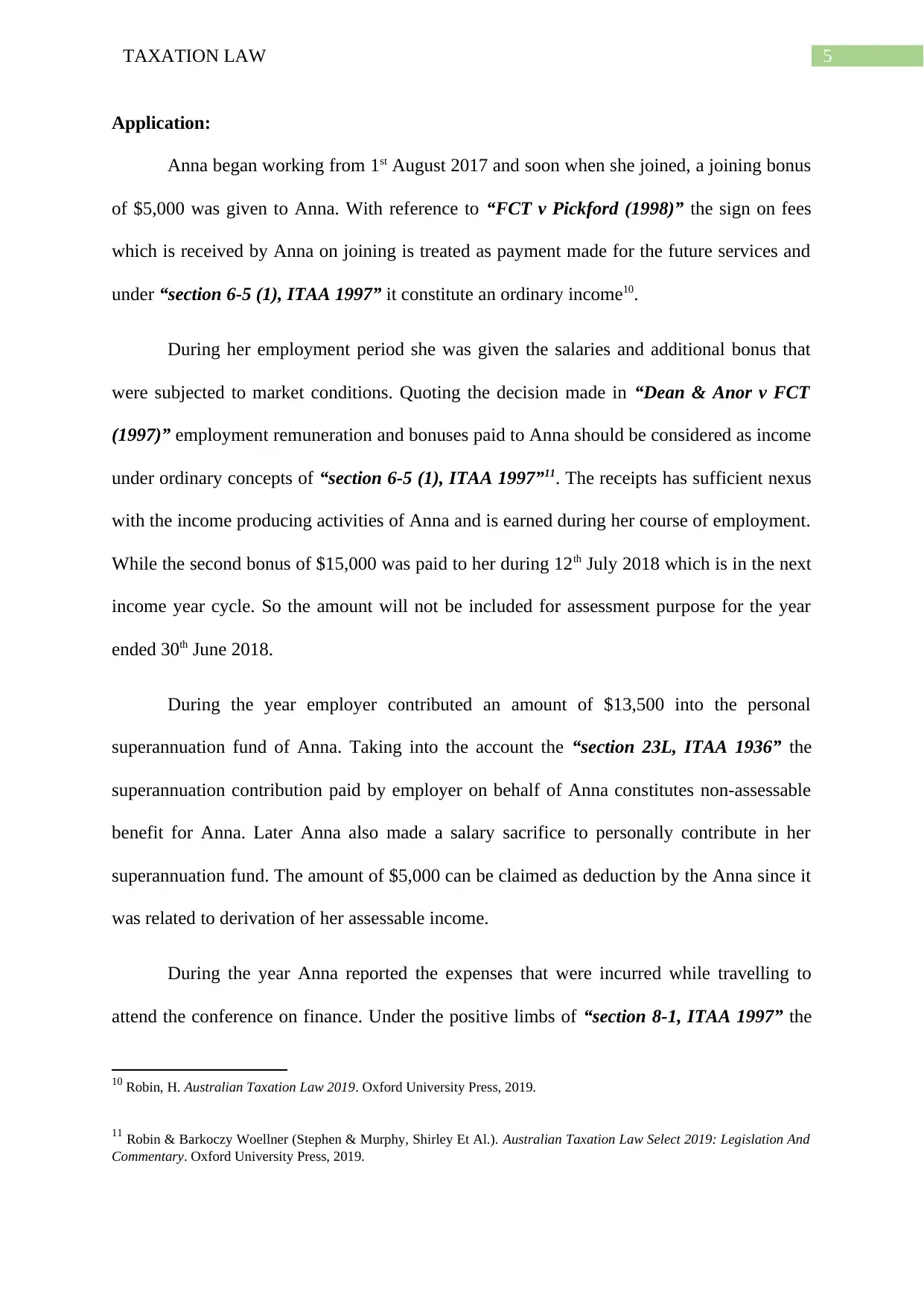
5TAXATION LAW
Application:
Anna began working from 1st August 2017 and soon when she joined, a joining bonus
of $5,000 was given to Anna. With reference to “FCT v Pickford (1998)” the sign on fees
which is received by Anna on joining is treated as payment made for the future services and
under “section 6-5 (1), ITAA 1997” it constitute an ordinary income10.
During her employment period she was given the salaries and additional bonus that
were subjected to market conditions. Quoting the decision made in “Dean & Anor v FCT
(1997)” employment remuneration and bonuses paid to Anna should be considered as income
under ordinary concepts of “section 6-5 (1), ITAA 1997”11. The receipts has sufficient nexus
with the income producing activities of Anna and is earned during her course of employment.
While the second bonus of $15,000 was paid to her during 12th July 2018 which is in the next
income year cycle. So the amount will not be included for assessment purpose for the year
ended 30th June 2018.
During the year employer contributed an amount of $13,500 into the personal
superannuation fund of Anna. Taking into the account the “section 23L, ITAA 1936” the
superannuation contribution paid by employer on behalf of Anna constitutes non-assessable
benefit for Anna. Later Anna also made a salary sacrifice to personally contribute in her
superannuation fund. The amount of $5,000 can be claimed as deduction by the Anna since it
was related to derivation of her assessable income.
During the year Anna reported the expenses that were incurred while travelling to
attend the conference on finance. Under the positive limbs of “section 8-1, ITAA 1997” the
10 Robin, H. Australian Taxation Law 2019. Oxford University Press, 2019.
11 Robin & Barkoczy Woellner (Stephen & Murphy, Shirley Et Al.). Australian Taxation Law Select 2019: Legislation And
Commentary. Oxford University Press, 2019.
Application:
Anna began working from 1st August 2017 and soon when she joined, a joining bonus
of $5,000 was given to Anna. With reference to “FCT v Pickford (1998)” the sign on fees
which is received by Anna on joining is treated as payment made for the future services and
under “section 6-5 (1), ITAA 1997” it constitute an ordinary income10.
During her employment period she was given the salaries and additional bonus that
were subjected to market conditions. Quoting the decision made in “Dean & Anor v FCT
(1997)” employment remuneration and bonuses paid to Anna should be considered as income
under ordinary concepts of “section 6-5 (1), ITAA 1997”11. The receipts has sufficient nexus
with the income producing activities of Anna and is earned during her course of employment.
While the second bonus of $15,000 was paid to her during 12th July 2018 which is in the next
income year cycle. So the amount will not be included for assessment purpose for the year
ended 30th June 2018.
During the year employer contributed an amount of $13,500 into the personal
superannuation fund of Anna. Taking into the account the “section 23L, ITAA 1936” the
superannuation contribution paid by employer on behalf of Anna constitutes non-assessable
benefit for Anna. Later Anna also made a salary sacrifice to personally contribute in her
superannuation fund. The amount of $5,000 can be claimed as deduction by the Anna since it
was related to derivation of her assessable income.
During the year Anna reported the expenses that were incurred while travelling to
attend the conference on finance. Under the positive limbs of “section 8-1, ITAA 1997” the
10 Robin, H. Australian Taxation Law 2019. Oxford University Press, 2019.
11 Robin & Barkoczy Woellner (Stephen & Murphy, Shirley Et Al.). Australian Taxation Law Select 2019: Legislation And
Commentary. Oxford University Press, 2019.
⊘ This is a preview!⊘
Do you want full access?
Subscribe today to unlock all pages.

Trusted by 1+ million students worldwide
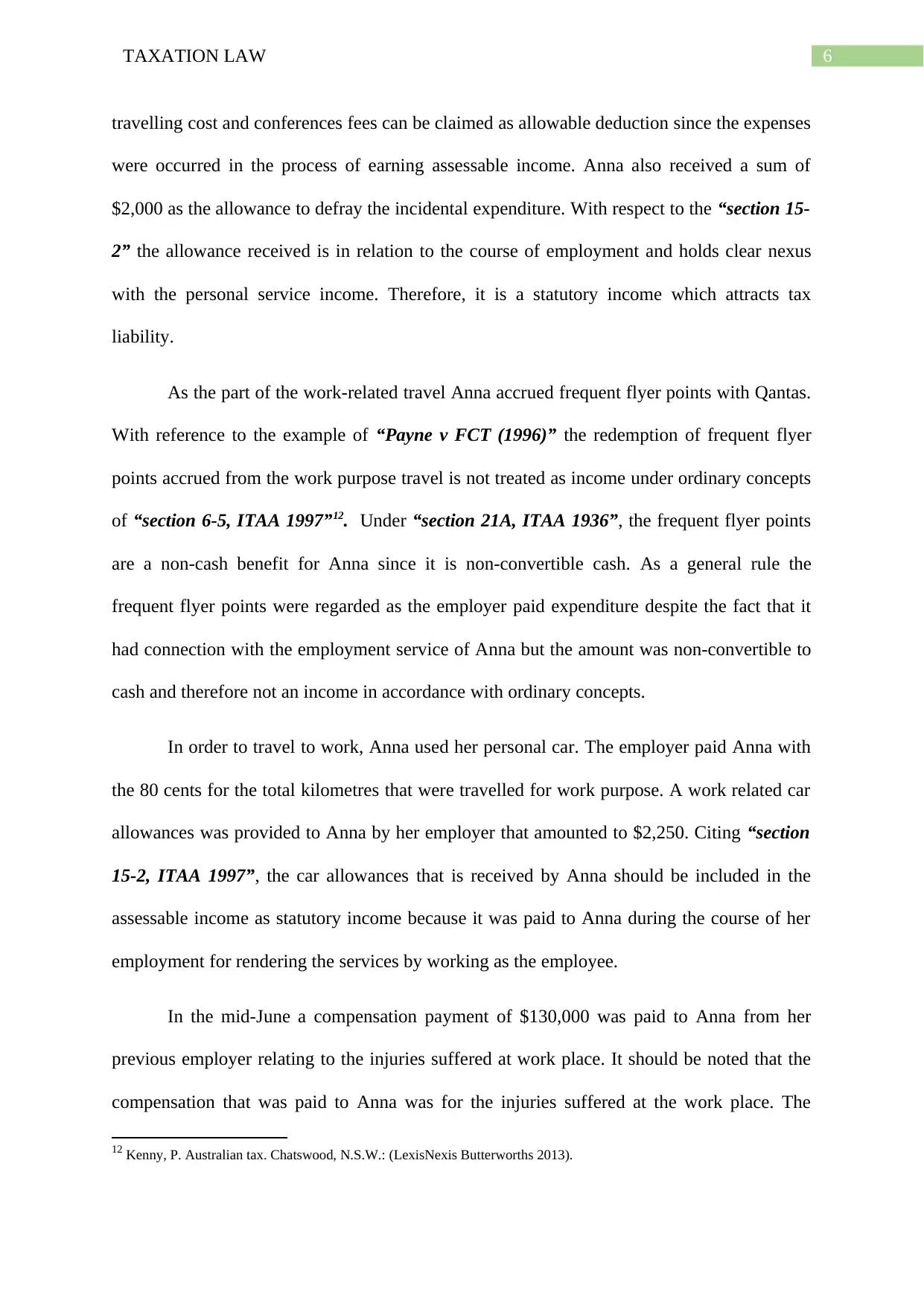
6TAXATION LAW
travelling cost and conferences fees can be claimed as allowable deduction since the expenses
were occurred in the process of earning assessable income. Anna also received a sum of
$2,000 as the allowance to defray the incidental expenditure. With respect to the “section 15-
2” the allowance received is in relation to the course of employment and holds clear nexus
with the personal service income. Therefore, it is a statutory income which attracts tax
liability.
As the part of the work-related travel Anna accrued frequent flyer points with Qantas.
With reference to the example of “Payne v FCT (1996)” the redemption of frequent flyer
points accrued from the work purpose travel is not treated as income under ordinary concepts
of “section 6-5, ITAA 1997”12. Under “section 21A, ITAA 1936”, the frequent flyer points
are a non-cash benefit for Anna since it is non-convertible cash. As a general rule the
frequent flyer points were regarded as the employer paid expenditure despite the fact that it
had connection with the employment service of Anna but the amount was non-convertible to
cash and therefore not an income in accordance with ordinary concepts.
In order to travel to work, Anna used her personal car. The employer paid Anna with
the 80 cents for the total kilometres that were travelled for work purpose. A work related car
allowances was provided to Anna by her employer that amounted to $2,250. Citing “section
15-2, ITAA 1997”, the car allowances that is received by Anna should be included in the
assessable income as statutory income because it was paid to Anna during the course of her
employment for rendering the services by working as the employee.
In the mid-June a compensation payment of $130,000 was paid to Anna from her
previous employer relating to the injuries suffered at work place. It should be noted that the
compensation that was paid to Anna was for the injuries suffered at the work place. The
12 Kenny, P. Australian tax. Chatswood, N.S.W.: (LexisNexis Butterworths 2013).
travelling cost and conferences fees can be claimed as allowable deduction since the expenses
were occurred in the process of earning assessable income. Anna also received a sum of
$2,000 as the allowance to defray the incidental expenditure. With respect to the “section 15-
2” the allowance received is in relation to the course of employment and holds clear nexus
with the personal service income. Therefore, it is a statutory income which attracts tax
liability.
As the part of the work-related travel Anna accrued frequent flyer points with Qantas.
With reference to the example of “Payne v FCT (1996)” the redemption of frequent flyer
points accrued from the work purpose travel is not treated as income under ordinary concepts
of “section 6-5, ITAA 1997”12. Under “section 21A, ITAA 1936”, the frequent flyer points
are a non-cash benefit for Anna since it is non-convertible cash. As a general rule the
frequent flyer points were regarded as the employer paid expenditure despite the fact that it
had connection with the employment service of Anna but the amount was non-convertible to
cash and therefore not an income in accordance with ordinary concepts.
In order to travel to work, Anna used her personal car. The employer paid Anna with
the 80 cents for the total kilometres that were travelled for work purpose. A work related car
allowances was provided to Anna by her employer that amounted to $2,250. Citing “section
15-2, ITAA 1997”, the car allowances that is received by Anna should be included in the
assessable income as statutory income because it was paid to Anna during the course of her
employment for rendering the services by working as the employee.
In the mid-June a compensation payment of $130,000 was paid to Anna from her
previous employer relating to the injuries suffered at work place. It should be noted that the
compensation that was paid to Anna was for the injuries suffered at the work place. The
12 Kenny, P. Australian tax. Chatswood, N.S.W.: (LexisNexis Butterworths 2013).
Paraphrase This Document
Need a fresh take? Get an instant paraphrase of this document with our AI Paraphraser
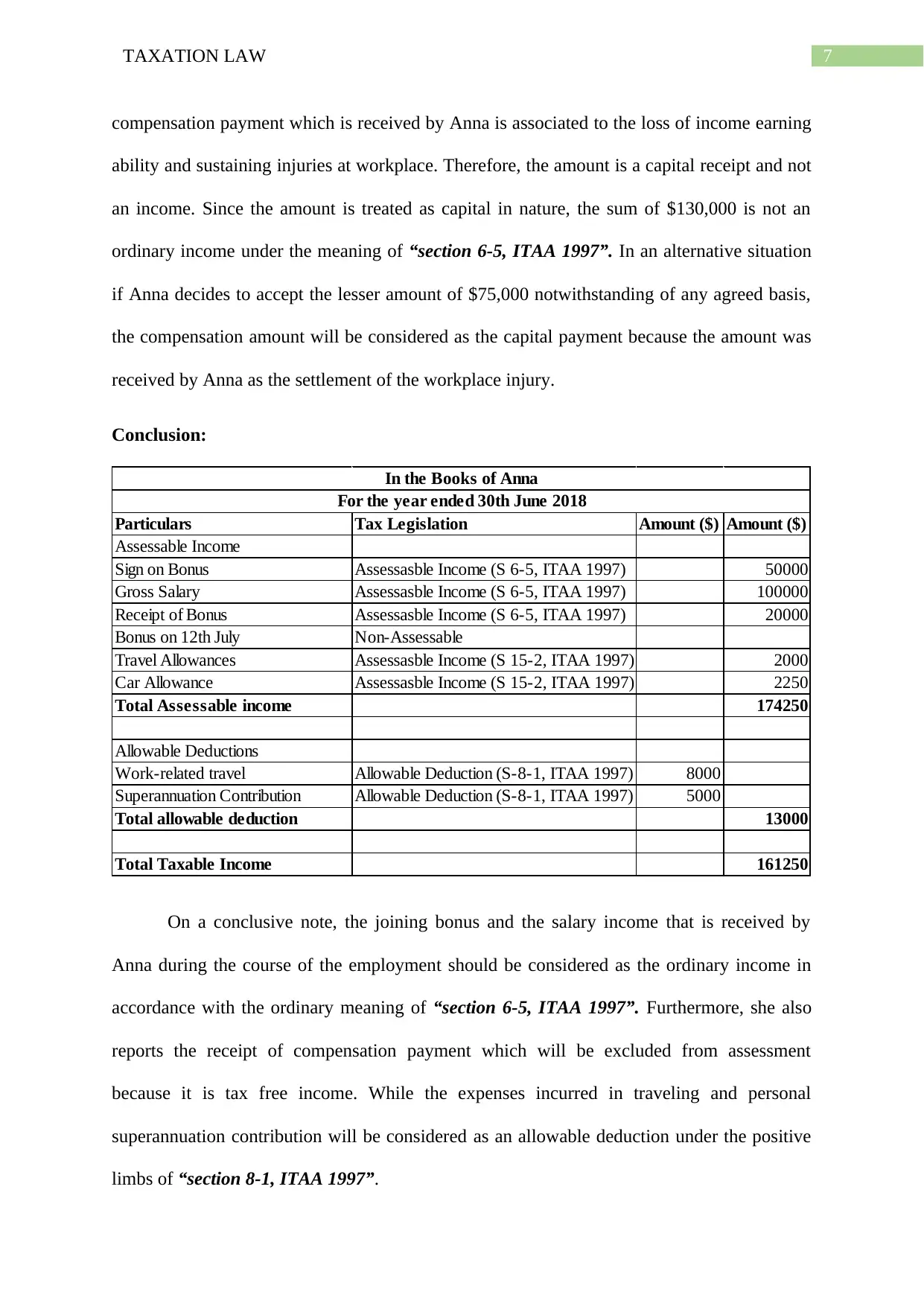
7TAXATION LAW
compensation payment which is received by Anna is associated to the loss of income earning
ability and sustaining injuries at workplace. Therefore, the amount is a capital receipt and not
an income. Since the amount is treated as capital in nature, the sum of $130,000 is not an
ordinary income under the meaning of “section 6-5, ITAA 1997”. In an alternative situation
if Anna decides to accept the lesser amount of $75,000 notwithstanding of any agreed basis,
the compensation amount will be considered as the capital payment because the amount was
received by Anna as the settlement of the workplace injury.
Conclusion:
Particulars Tax Legislation Amount ($) Amount ($)
Assessable Income
Sign on Bonus Assessasble Income (S 6-5, ITAA 1997) 50000
Gross Salary Assessasble Income (S 6-5, ITAA 1997) 100000
Receipt of Bonus Assessasble Income (S 6-5, ITAA 1997) 20000
Bonus on 12th July Non-Assessable
Travel Allowances Assessasble Income (S 15-2, ITAA 1997) 2000
Car Allowance Assessasble Income (S 15-2, ITAA 1997) 2250
Total Assessable income 174250
Allowable Deductions
Work-related travel Allowable Deduction (S-8-1, ITAA 1997) 8000
Superannuation Contribution Allowable Deduction (S-8-1, ITAA 1997) 5000
Total allowable deduction 13000
Total Taxable Income 161250
In the Books of Anna
For the year ended 30th June 2018
On a conclusive note, the joining bonus and the salary income that is received by
Anna during the course of the employment should be considered as the ordinary income in
accordance with the ordinary meaning of “section 6-5, ITAA 1997”. Furthermore, she also
reports the receipt of compensation payment which will be excluded from assessment
because it is tax free income. While the expenses incurred in traveling and personal
superannuation contribution will be considered as an allowable deduction under the positive
limbs of “section 8-1, ITAA 1997”.
compensation payment which is received by Anna is associated to the loss of income earning
ability and sustaining injuries at workplace. Therefore, the amount is a capital receipt and not
an income. Since the amount is treated as capital in nature, the sum of $130,000 is not an
ordinary income under the meaning of “section 6-5, ITAA 1997”. In an alternative situation
if Anna decides to accept the lesser amount of $75,000 notwithstanding of any agreed basis,
the compensation amount will be considered as the capital payment because the amount was
received by Anna as the settlement of the workplace injury.
Conclusion:
Particulars Tax Legislation Amount ($) Amount ($)
Assessable Income
Sign on Bonus Assessasble Income (S 6-5, ITAA 1997) 50000
Gross Salary Assessasble Income (S 6-5, ITAA 1997) 100000
Receipt of Bonus Assessasble Income (S 6-5, ITAA 1997) 20000
Bonus on 12th July Non-Assessable
Travel Allowances Assessasble Income (S 15-2, ITAA 1997) 2000
Car Allowance Assessasble Income (S 15-2, ITAA 1997) 2250
Total Assessable income 174250
Allowable Deductions
Work-related travel Allowable Deduction (S-8-1, ITAA 1997) 8000
Superannuation Contribution Allowable Deduction (S-8-1, ITAA 1997) 5000
Total allowable deduction 13000
Total Taxable Income 161250
In the Books of Anna
For the year ended 30th June 2018
On a conclusive note, the joining bonus and the salary income that is received by
Anna during the course of the employment should be considered as the ordinary income in
accordance with the ordinary meaning of “section 6-5, ITAA 1997”. Furthermore, she also
reports the receipt of compensation payment which will be excluded from assessment
because it is tax free income. While the expenses incurred in traveling and personal
superannuation contribution will be considered as an allowable deduction under the positive
limbs of “section 8-1, ITAA 1997”.

8TAXATION LAW
⊘ This is a preview!⊘
Do you want full access?
Subscribe today to unlock all pages.

Trusted by 1+ million students worldwide
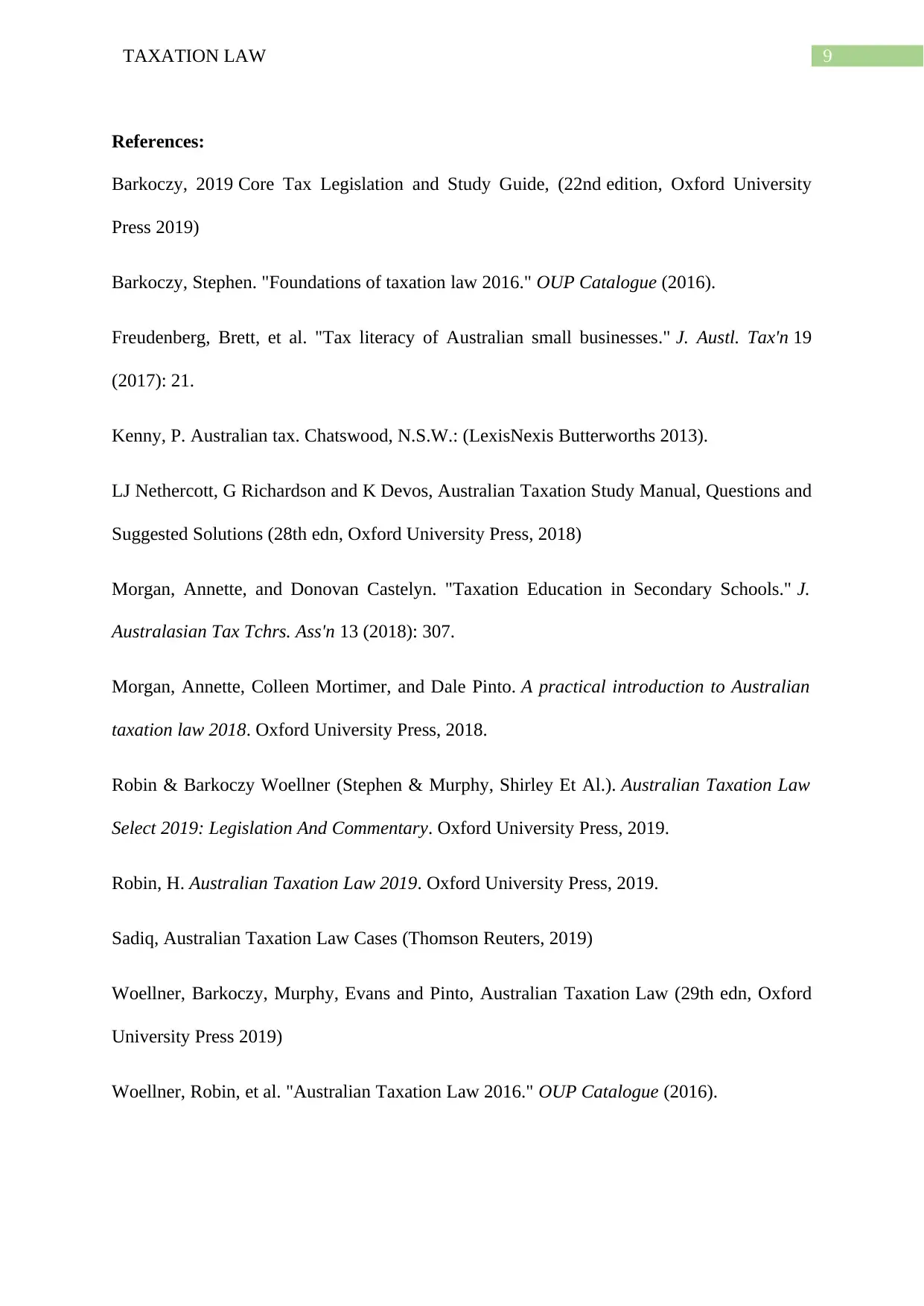
9TAXATION LAW
References:
Barkoczy, 2019 Core Tax Legislation and Study Guide, (22nd edition, Oxford University
Press 2019)
Barkoczy, Stephen. "Foundations of taxation law 2016." OUP Catalogue (2016).
Freudenberg, Brett, et al. "Tax literacy of Australian small businesses." J. Austl. Tax'n 19
(2017): 21.
Kenny, P. Australian tax. Chatswood, N.S.W.: (LexisNexis Butterworths 2013).
LJ Nethercott, G Richardson and K Devos, Australian Taxation Study Manual, Questions and
Suggested Solutions (28th edn, Oxford University Press, 2018)
Morgan, Annette, and Donovan Castelyn. "Taxation Education in Secondary Schools." J.
Australasian Tax Tchrs. Ass'n 13 (2018): 307.
Morgan, Annette, Colleen Mortimer, and Dale Pinto. A practical introduction to Australian
taxation law 2018. Oxford University Press, 2018.
Robin & Barkoczy Woellner (Stephen & Murphy, Shirley Et Al.). Australian Taxation Law
Select 2019: Legislation And Commentary. Oxford University Press, 2019.
Robin, H. Australian Taxation Law 2019. Oxford University Press, 2019.
Sadiq, Australian Taxation Law Cases (Thomson Reuters, 2019)
Woellner, Barkoczy, Murphy, Evans and Pinto, Australian Taxation Law (29th edn, Oxford
University Press 2019)
Woellner, Robin, et al. "Australian Taxation Law 2016." OUP Catalogue (2016).
References:
Barkoczy, 2019 Core Tax Legislation and Study Guide, (22nd edition, Oxford University
Press 2019)
Barkoczy, Stephen. "Foundations of taxation law 2016." OUP Catalogue (2016).
Freudenberg, Brett, et al. "Tax literacy of Australian small businesses." J. Austl. Tax'n 19
(2017): 21.
Kenny, P. Australian tax. Chatswood, N.S.W.: (LexisNexis Butterworths 2013).
LJ Nethercott, G Richardson and K Devos, Australian Taxation Study Manual, Questions and
Suggested Solutions (28th edn, Oxford University Press, 2018)
Morgan, Annette, and Donovan Castelyn. "Taxation Education in Secondary Schools." J.
Australasian Tax Tchrs. Ass'n 13 (2018): 307.
Morgan, Annette, Colleen Mortimer, and Dale Pinto. A practical introduction to Australian
taxation law 2018. Oxford University Press, 2018.
Robin & Barkoczy Woellner (Stephen & Murphy, Shirley Et Al.). Australian Taxation Law
Select 2019: Legislation And Commentary. Oxford University Press, 2019.
Robin, H. Australian Taxation Law 2019. Oxford University Press, 2019.
Sadiq, Australian Taxation Law Cases (Thomson Reuters, 2019)
Woellner, Barkoczy, Murphy, Evans and Pinto, Australian Taxation Law (29th edn, Oxford
University Press 2019)
Woellner, Robin, et al. "Australian Taxation Law 2016." OUP Catalogue (2016).
Paraphrase This Document
Need a fresh take? Get an instant paraphrase of this document with our AI Paraphraser

10TAXATION LAW
1 out of 11
Related Documents
Your All-in-One AI-Powered Toolkit for Academic Success.
+13062052269
info@desklib.com
Available 24*7 on WhatsApp / Email
![[object Object]](/_next/static/media/star-bottom.7253800d.svg)
Unlock your academic potential
Copyright © 2020–2026 A2Z Services. All Rights Reserved. Developed and managed by ZUCOL.





